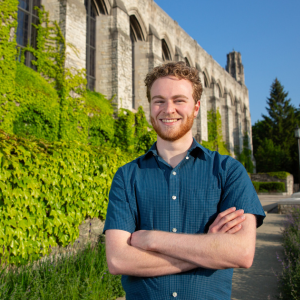Northwestern’s Post-Baccalaureate Program Propels Oliver’s Future in Neuroprosthetics and Robotics

Oliver Sterling-Angus ’25 was a year away from receiving his undergraduate degree and working as a research technician in Northwestern University’s neurology department when he learned about the Northwestern SPS Specialized Studies for Career Advancement post-baccalaureate program. At work, he developed an interest in neuroprosthetics and robotics, with the goal of eventually pursuing a PhD in the field.
He met with a Northwestern SPS enrollment advisor, originally intending to apply for an undergraduate certificate in AI. “She suggested, ‘Take the post-baccalaureate level, and you'll get to choose everything that you want. And that's how it came to be,” he says. The post-baccalaureate certificate program would catch him up on all the necessary prerequisites for a PhD program with a curriculum he could customize based on his unique background and specific interests. “There aren’t any post-baccs for [going from] neuroscience to engineering. The specialized studies program is perfect because I could tailor it to exactly what I needed,” Oliver says.
In 2022, Oliver became the first student to graduate from DePaul University with both a BFA in acting and a BS in neuroscience. He was drawn to the latter after taking a neuroscience class out of sheer curiosity. “I was thinking about understanding the emotions and cognition on stage, and I was learning about it through a scientific perspective, and I liked that," he says.
Oliver loves how neuroscience tackles impossible questions. “The things that I find fascinating about computer science are also fascinating about the brain. Computer science is so logic-oriented. If you make enough binaries and scale out, you get complex behavior, similar to how neurons and networks work in the brain.”
Practical Knowledge on a Flexible Schedule at Northwestern SPS
Some of Oliver’s courses include Calculus II, Intro to Programming, Python for Data Science, and Python for Embedded Systems. At work in the neurology department, Oliver’s team studies motor neuron diseases like ALS at the cellular level. Their experiments result in hundreds to thousands of microscopy images, and thanks to his Python training, he can write scripts to comb through the images and compile, process, and analyze the data automatically. "I wouldn't have been able to do that without my course. It's totally changed how I view any computer task,” he says. “That's been one of the most helpful things that I've gained directly from the Northwestern SPS program.”
Oliver says the program's faculty helped him appreciate how his eclectic background could be an asset. He discovered that his Calculus II teacher, Amy Alzhauer, had the opposite academic experience from him, with an undergraduate degree in math and an MFA in creative writing. "She was great because it wasn't just a Calculus II class where it’s like, 'Okay, this number goes here, and this formula is used this way.' She would integrate the history and the story of the math and what it meant.” Alzhauer’s course, Oliver says, “transformed calculus from formulas to memorize to how it impacted the world.”
The part-time program's overall flexibility and curriculum have been a natural fit for Oliver’s needs. “I'm taking about one class per quarter, and they're typically online or in the evening. That's another great thing about Northwestern SPS: it fits with my schedule,” he says. He has even been able to take courses from other schools within Northwestern to round out his curriculum, with the added perk of Oliver lining up for a summer lab position with one of his professors. “It’s a robotics lab at the Center for Robotics and Biosystems. I wouldn't have had that sort of opportunity without this program.”
Capitalizing on a Unique Background with a Specialized Studies for Career Advancement Post-Baccalaureate
Oliver will soon apply to graduate school to attain his PhD and is considering a long-term goal of working in robotics and neuroprosthetics. "People can now implant brain-computer interfaces directly into a brain or a nerve and have actual sensations when their hand touches something. That is super crazy and cool to me.”
He believes his theater background only enhances his scientific work. “What I got from a theater degree was communication: telling a story, knowing who your audience is, and how that changes how you share things, how to connect with people." While research, data, and experiments are essential, what's also important is telling what he calls a scientific story. "When you have a research paper, how are you organizing your experiments to tell a story and have a narrative arc of data?” He says that even the best research and clearest results can only be so useful if its meaning isn’t clearly communicated. “There are fantastic scientists who have awesome data, but it doesn't get to the general public in a way that is digestible.”
Oliver admits that, at times, he worried he was behind as someone who didn't specialize earlier. "I kept feeling like, ‘Oh gosh, how do I catch up with people who've been in a lab since they were 17?’ I've realized there's no race or timeframe. You are always going to get there, and when you get to the place you want to be, then people go, ‘Oh, you have such an interesting background.’"
Northwestern University School of Professional Studies offers many degree and certificate programs, with evening and online options available. To learn more about Northwestern University's Specialized Studies for Career Advancement post-baccalaureate program, fill out the form below and we will be in touch with you soon.
